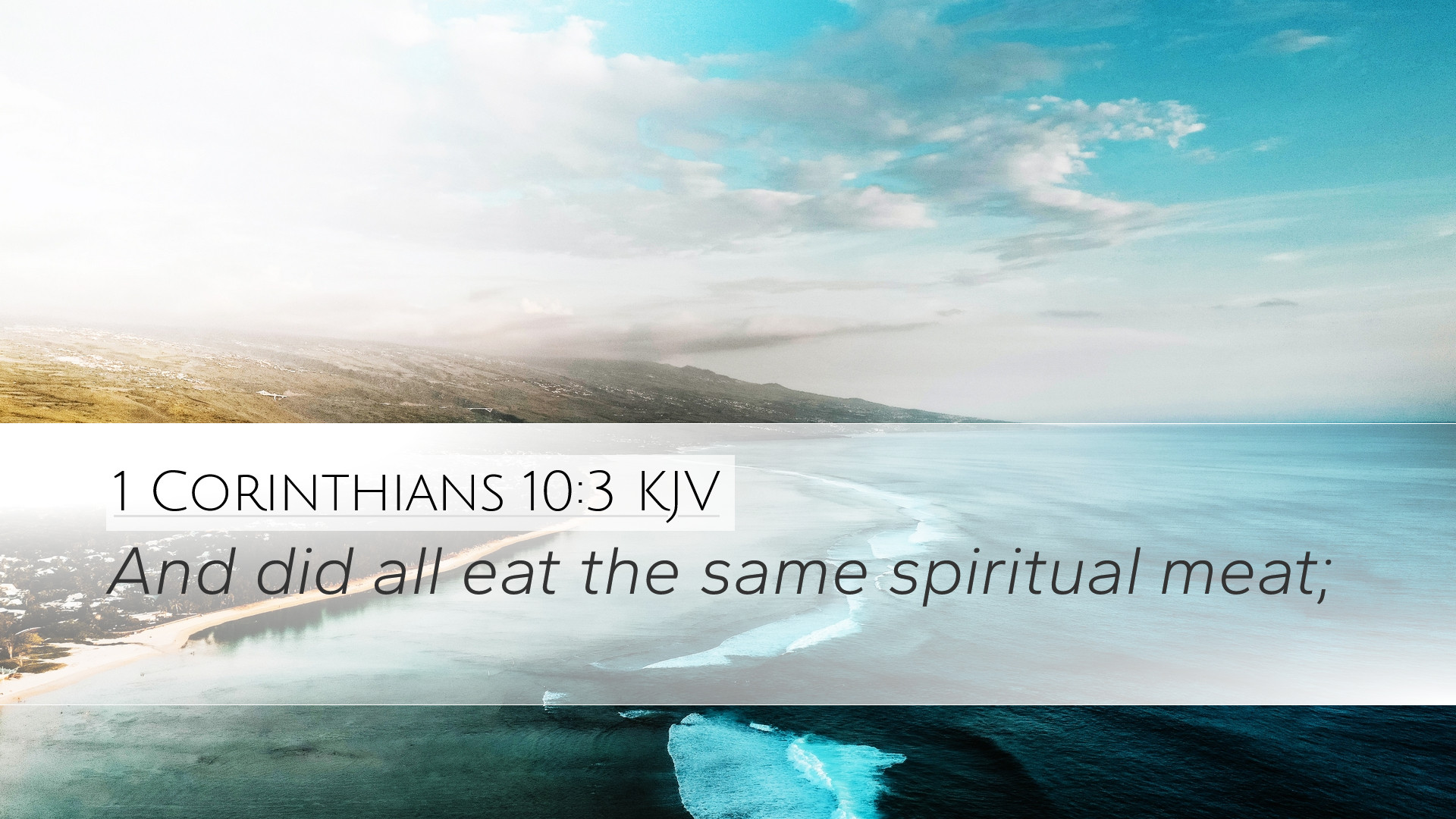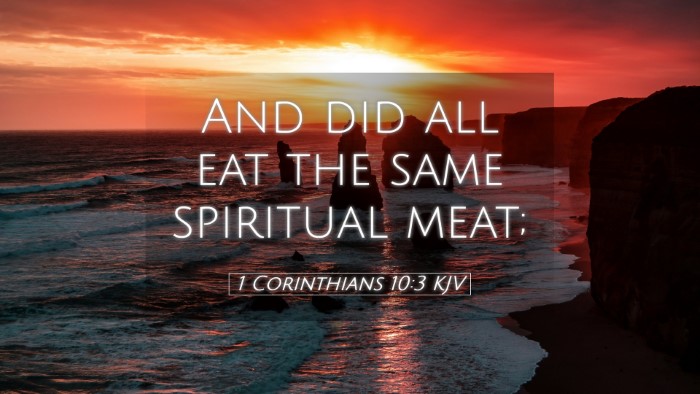Commentary on 1 Corinthians 10:3
Bible Verse: "And did all eat the same spiritual meat;" (1 Corinthians 10:3, KJV)
This verse is part of Apostle Paul’s discourse where he draws lessons from the history of Israel in the wilderness, applying them to the Corinthian church and, by extension, to all Christians. Understanding this verse involves exploring several key elements: the notion of spiritual nourishment, the community of believers, and the foreshadowing of Christ's sacrifice.
1. Spiritual Nourishment
Matthew Henry emphasizes the term "spiritual meat" by noting that although the Israelites physically consumed manna, it represented far more than mere sustenance; it was a divine provision meant to lead them spiritually. The food they received was not just for survival in the wilderness but symbolic of their dependence on God for all things, echoing the sentiments of Jesus when He stated, "Man shall not live by bread alone, but by every word that proceedeth out of the mouth of God" (Matthew 4:4).
Albert Barnes comments on this “spiritual meat,” interpreting it as a foreshadowing of Christ. Paul alludes to how the manna in the wilderness points to Christ—Christian believers partake in a spiritual nourishment that sustains them. He also implies that just as Israel was sustained miraculously, so too must believers rely on Jesus, who is the true Bread from Heaven (John 6:32-33).
Adam Clarke adds that this spiritual sustenance relates to the whole community of believers who partake in this sacrificial love of Christ. Unlike the Israelites who consumed manna, Christians share in the communion and fellowship of Christ’s body and blood—a profound and transformative act that nourishes their spirits and builds unity within the Church.
2. Community of Believers
Paul’s remark “did all eat” highlights the communal aspect of the spiritual journey. Paul asserts that everyone partook equally, suggesting inclusivity and shared experience among the believers. No one was left out of this divine provisioning, a vital component for the community.
Matthew Henry suggests that this unity is critical to understanding the collective experience of Israel and Christian believers. Just as the entire nation of Israel was fed, so Christians collectively partake of the benefits of Christ’s sacrifice, reflecting a shared faith and identity imbued with spiritual significance.
Albert Barnes further explains that Paul’s reference to "all" is an admonition to the church in Corinth—a reminder that individual actions affect the whole body. The dangers of divisions and factions in the church could potentially sever their communal bond, which he emphasizes consistently throughout his letters.
3. Foreshadowing of Christ
The reference to "spiritual meat" necessitates a focus on how the Old Testament typology is fulfilled in the New Testament through Christ. Paul draws a theological link in understanding how the experiences of Israel symbolize Christ's redemptive work.
Adam Clarke points out that this verse acts as a bridge connecting the Old Covenant and the New Covenant. The manna was a precursor to the greater spiritual nourishment found in Christ. For believers today, this means recognizing the Old Testament's role in foreshadowing Christian salvation through the sacrificial death and resurrection of Jesus Christ.
4. Application for Believers
This verse reminds modern Christians of their need for spiritual nourishment which encapsulates both individual and communal aspects of faith. The intake of ‘spiritual food’ is not a solitary endeavor for believers. Indeed, it underscores the importance of community worship, fellowship, and shared understanding of Christ's sacrifice.
- Understanding the importance of daily spiritual nourishment is essential for personal growth and community wellness.
- Engaging in regular communion observances reminds believers of their collective experience and relationship with Christ.
- Acknowledging that no one believer functions independently; all are part of the body of Christ, contributing to the overall vitality of faith.
5. Conclusion
The reflection on 1 Corinthians 10:3 provides a rich theological foundation that highlights the importance of spiritual sustenance, community involvement, and the foreshadowing of Christ’s ministry. As believers consume the “spiritual meat”, they must remember that such sustenance calls for intended action—living out their faith collectively and individually, reflecting the unity exhibited in the life of Jesus Christ.
In conclusion, just as the Israelites did not rebel but received daily bread from Heaven, may today’s church be encouraged to seek continuous spiritual nourishment through the Word and fellowship with one another, celebrating the great mystery of salvation found in Christ alone.


